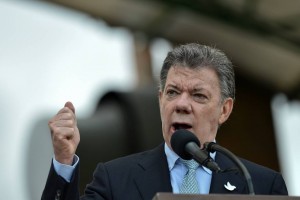Our government will hold FARC fighters responsible for their crimes. Honoring victims’ rights is essential.
By Humberto De La Calle, June 6, 2016, published in the Wall Street Journal
 Colombia has endured for more than half a century a bloody internal war, costing too many lives and causing severe pain to millions of victims. The conflict has forcefully displaced millions of peasants from their home and impeded the country’s capacity to grow and prosper.
Colombia has endured for more than half a century a bloody internal war, costing too many lives and causing severe pain to millions of victims. The conflict has forcefully displaced millions of peasants from their home and impeded the country’s capacity to grow and prosper.
For decades, successive Colombian governments have sought peace unsuccessfully. President Juan Manuel Santos, after decisively leading military efforts to defeat the guerrillas known as the FARC (for the Spanish name of the Armed Revolutionary Forces of Colombia), is now leading a promising peace process. I am Colombia’s chief negotiator in the talks.
The presidential peace initiative comes from strength, not weakness. An honorable agreement that respects the fundamental values of Colombia’s democracy, the rule of law and the nation’s economic system is the only way to put a definitive end to any internal conflict.
The negotiations have been transparent, honest and conducted in front of the Colombian people and the international community. Understandably, the initial contacts between the government and the FARC were kept confidential to protect the process’s early viability. As soon as an agenda was defined, the negotiation was made public. When partial agreements have been reached, they have been presented publicly.
Regarding the agreements themselves, there are some essential facts that must be underscored.
There will be sanctions to those responsible of serious crimes—there will be no amnesties. The Colombian agreement is remarkable in that it has included, from its inception, sanctions on individuals who committed serious crimes. Those responsible
for serious crimes will be held accountable in court for their actions. If those convicted acknowledge their responsibility, compensate their victims and pledge not to recidivate, they will obtain reduced sentences. Those who don’t confess and are convicted will go to jail for up to 20 years.
In addition to sanctioning guerrilla members responsible for serious crimes, the agreement will give fair treatment to members of the Colombian military held responsible for serious crimes. These members of the military will have to face courts and, if convicted, will be given the chance to aid investigations in exchange for reduced sentences. Former Armed Forces Commander Gen. Jorge Enrique Mora and former National Police Director Gen. Oscar Naranjo are two of the government negotiators, and the provision has gained widespread approval by members of the military.
A cornerstone of this peace process is victims’ rights and reparation. Without reparation of the victims—including all widely recognized victims’ rights: truth, justice, economic reparation and certainty of no future victimization—there will be no lasting peace in Colombia.
Contrary to claims by critics of the negotiations, the guerrillas will abandon their arms—in a process that will be supervised by a tripartite mechanism including the United Nations.
The final agreement must be approved by Colombia’s democratic institutions: Congress must ratify it, and then the agreement will be reviewed by the Constitutional Court—the nation’s highest court—to certify that it is lawful.
But President Santos made a public commitment from the start: Colombian citizens will have the final word. In line with that pledge, for the final agreement to be enacted it must be approved through a plebiscite by Colombian voters.
To facilitate the implementation of various aspects of the agreement, a fast-track procedure in Congress will be put in place, but that provision will in no way override congressional authority and lawmaking powers.
It has been rewarding to see the Colombian peace process supported around the world, by the Obama administration and the U.S. Congress, by the U.N. Security Council and the European Union, and by Colombia’s neighbors and nations overseas. Their vows to support Colombia’s reconciliation and postconflict efforts underscore the significance of this historic peace initiative and are much appreciated.
President Santos is determined to seek peace. That was the mandate from his re-election in 2014, but the agreement must benefit all Colombians and respect the nation’s values and institutions. Then Colombia will have the opportunity to achieve its full potential as a stable democracy promoting economic and social progress.
Mr. de la Calle is the Colombian government’s chief peace negotiator.
Read the original article here.

Leave A Comment
You must be logged in to post a comment.